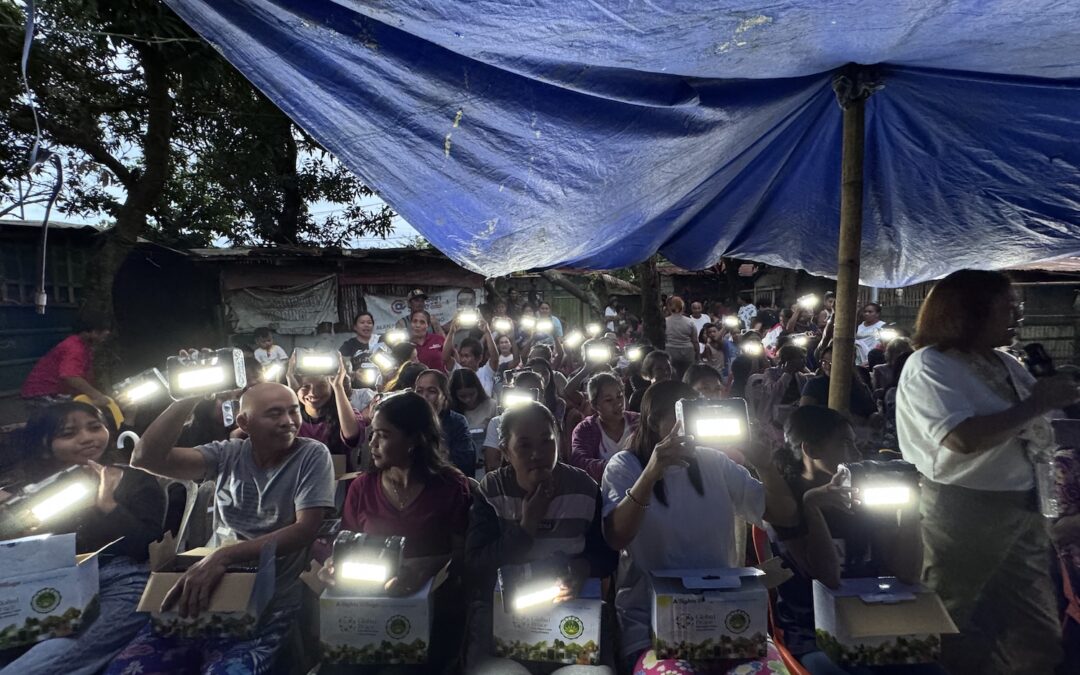“When we practice a lifestyle of service, truly living for others, we exemplify the highest ideals of human character.”
Dr. Hyun Jin P. Moon (Global Peace Convention, Philippines, 2009)
The holiday season is often seen as a time for reflection, gratitude, and giving. It’s a time when communities come together, whether through family gatherings, charity events, or volunteer work. Yet, it’s also a moment to reflect on something deeper: the role that service plays in building peace around the world.
One inspiring example of this principle in action during this last holiday season comes from Candelaria, Quezon, where the Global Peace Foundation Philippines (GPF Philippines) and local partners launched an impactful initiative that not only lit up homes but also brightened the futures of many residents.
Light as a Symbol of Hope and Innovation
In a heartwarming display of community service, GPF Philippines handed over 100 solar lanterns and 10 solar street lights to the residents of Candelaria as part of the All-Lights Village initiative. This project, which serves as both a Christmas gift and a year-round solution to rural electrification, underscores the significance of moral leadership and innovative thinking in addressing some of the world’s most persistent challenges.
The project’s impact extends beyond its practical benefits. Solar-powered lanterns and streetlights don’t just provide light; they offer hope and security, transforming the way communities live and thrive. This act of service represents the powerful intersection of sustainability, renewable energy, and social impact—all essential elements of a brighter, more equitable future.
Developing Moral Leadership Through Service
At the heart of every service project lies the opportunity for moral leadership. Leaders in the project understand that true leadership goes beyond authority or decision-making—it is about creating positive change and inspiring others to act with compassion and responsibility. The executive director of GPF Philippines talked about the symbolic role of light—representing hope, unity, and progress—and highlighted how service can lead to transformative leadership.
Such leadership is about much more than solving immediate problems. It’s about cultivating values like integrity, compassion, and selflessness. By actively engaging in service, leaders demonstrate their commitment to improving the well-being of others, which in turn fosters a culture of empathy and collaboration. Whether it’s through giving resources, time, or expertise, leaders who embrace service as a core tenet of their mission create ripple effects of positive change.
Innovative Solutions to Real-World Problems
The All-Lights Village initiative doesn’t just address an immediate need for light; it embodies an innovative approach to tackling long-term issues. In rural areas like Candelaria, access to reliable electricity is often limited. Solar-powered lanterns and streetlights are a sustainable solution that enhances safety and mobility and reduces dependency on conventional energy sources.
This is where the power of innovation intersects with moral leadership. By harnessing renewable energy to provide light, this initiative is helping to break the cycle of poverty while also addressing environmental concerns. It showcases how out-of-the-box thinking—in this case, solar technology—can offer practical, scalable solutions to global challenges like rural electrification and climate change.
The program’s success is due, in large part, to the collaborative efforts of multiple partners. A leader of a local organization eloquently captured the essence of this partnership by highlighting how collective action can result in lasting change. “True progress begins when we come together, with compassion and commitment, to light the way for others,” she said. This statement exemplifies the power of community-based solutions, where each partner brings unique strengths to the table for the greater good.
The Role of Service in Building Stronger Communities
The All-Lights Village initiative is a reminder that sustainable development requires more than just financial investment or technology. It requires a commitment to the well-being of others and an acknowledgment that progress is not just about improving infrastructure—it’s about improving lives. As GPF Philippines continues to lead such initiatives, they reaffirm their commitment to fostering self-reliant and resilient communities, guided by the principle of “living for the greater good.”
This concept of service-driven leadership is crucial in the 21st century, where challenges like environmental sustainability, poverty, and inequality continue to test our collective ability to innovate and collaborate. It is through service—whether it’s bringing light to a rural community, helping those in need, or offering new solutions to persistent problems—that we unlock the true potential of leadership and innovation.
Conclusion: Leading by Example
The Global Peace Foundation’s initiative in Candelaria exemplifies the profound impact of service in moral leadership and innovative solutions. It serves as a powerful reminder that true leadership doesn’t reside only in boardrooms or decision-making offices. Sometimes, it’s in the simple, everyday acts of service that leaders show the world what it means to care, innovate, and build a brighter future for all.
As we face the world’s most pressing challenges, let us take inspiration from these acts of giving. Let us embrace service as a core value in leadership, always seeking new and better ways to solve problems and uplift communities. When we lead with compassion and a commitment to the greater good, we not only solve problems—we ignite the light of hope that can guide others toward a brighter, more sustainable future.
The original post appears on Global Peace Foundation. Global Peace Foundation is an international non-sectarian, non-partisan, nonprofit organization, which promotes an innovative, values-based approach to peacebuilding, guided by the vision of One Family under God. GPF engages and organizes a global network of public and private-sector partners who develop community, national, and regional peacebuilding models as the foundation for ethical and cohesive societies. Dr. Hyun Jin Preston Moon is the founder and chairman of the Global Peace Foundation.

